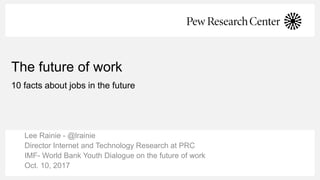
10 Facts on the Future of Work and Automation's Impact on Jobs
- 1. The future of work 10 facts about jobs in the future Lee Rainie - @lrainie Director Internet and Technology Research at PRC IMF- World Bank Youth Dialogue on the future of work Oct. 10, 2017
- 2. October 10, 2017 1) The nature of jobs is changing as the knowledge economy rises http://www.pewsocialtrends.org/2016/10/06/the-state-of-american-jobs/
- 3. October 10, 2017 1) The nature of jobs is changing as the knowledge economy rises 50% 83 77 18 All occupations Occupations requiring higher levels of ... Analytical skills Physical skills Social skills http://www.pewsocialtrends.org/2016/10/06/the-state-of-american-jobs/ % change in employment, 1980-2015
- 4. October 10, 2017 4 2) Since 1990, employment growth most rapid in education and health services 105 99 81 63 39 32 30 23 Educational services Health care and social assistance Professional and business services Leisure and hospitality Transportation and warehousing Other services All Financial activities % change in industry employment, 1990-2015 http://www.pewsocialtrends.org/2016/10/06/the-state-of-american-jobs/
- 5. 32 30 23 22 20 19 12 7 2 -25 -30 warehousing Other services All Financial activities Construction Government Retail trade Wholesale trade Mining and logging Information Utilities Manufacturing October 10, 2017 % change in industry employment, 1990-2015 http://www.pewsocialtrends.org/2016/10/06/the-state-of-american-jobs/
- 6. 3) Automation, robots, artificial intelligence are taking over workers’ traditional tasks 47% Oxford researchers calculate this is the percentage of American employment that is at risk because of the expected impacts of computerization in the foreseeable future 50% McKinsey analysts estimate this is the share of activities workers are paid to do now that could be automated using currently available technologies – accounting for $15 trillion in wages October 10, 2017 6 http://www.oxfordmartin.ox.ac.uk/downloads/academic/The_Future_of_Employment.pdf https://www.mckinsey.com/global-themes/digital-disruption/harnessing-automation-for-a-future-that-works
- 7. 3) Automation, robots, artificial intelligence are taking over workers’ traditional tasks October 10, 2017 https://arxiv.org/pdf/1705.08807.pdf 45 years The timeframe estimated by artificial intelligence experts when “high level machine intelligence” – unaided machines that can accomplish any given task better and more cheaply than humans – will be developed - 2024: outperform language translators - 2027: drive a truck - 2031 : work in retail - 2049: write best selling book - 2053: work as a surgeon
- 8. October 10, 2017 4) People think many professions at risk – but not their own jobs % of U.S. adults who think it is ___ likely that the following jobs will be replaced by robots or computers in their lifetimes http://www.pewinternet.org/2017/10/04/automation-in-everyday-life/
- 9. 5) People express more worry than optimism about future automation October 10, 2017 http://www.pewinternet.org/2017/10/04/automation-in-everyday-life/
- 10. October 10, 2017 6) Workers express more positive than negative views on overall impact of technology on their careers http://www.pewinternet.org/2017/10/04/automation-in-everyday-life/ % of U.S. workers who say the following
- 11. 7) Workers with higher levels of education more likely to say tech has increased opportunities, made jobs more interesting October 10, 2017 64 5354 51 38 32 Made their work more interesting Increased their opportunities for advancement College grad+ Some college HS grad or less http://www.pewinternet.org/2017/10/04/automation-in-everyday-life/
- 12. 40 35 37 33 22 23 10 10 45 49 48 49 47 41 27 25 12 12 13 16 26 26 40 43 Extremely important Having a detailed understanding of how to use computer technology Being able to work with people from many different backgrounds Training in writing and communicating Access to training to keep skills up to date Mastering social media Knowing a foreign language Very important Somewhat important Training in math and science Knowing a computer or programming language NET 85% 85% 85% 82% 69% 64% 37% 36% 8) People think knowledge of computers, social dexterity, communications skills and access to training are key to success
- 13. October 10, 2017 9) Americans think individuals and public schools should have the most responsibility to make sure workers have the right skills 72 60 52 49 40 35 22 28 35 39 35 34 3 7 7 8 15 18 1 3 5 3 9 11 A lot of Some Only a little None Individuals themselves Public K-12 education system Colleges and universities Employers State governments Federal government http://www.pewsocialtrends.org/2016/10/06/the-state-of-american-jobs/ % saying these groups should have ___ responsibility in making sure that the American workforce has the right skills and education to be successful in today's economy
- 14. In the next 10 years, do you think we will see the emergence of new educational and training programs that can successfully train large numbers of workers in the skills they will need to perform the jobs of the future? 70% “yes” 30% “no 10) Experts see major changes in education and jobs training programs http://www.pewinternet.org/2017/05/03/the-future-of-jobs-and-jobs-training/
- 15. Theme 1) The training ecosystem will evolve, with a mix of innovation in all education formats Theme 2) Learners must cultivate 21st-century skills, capabilities and attributes: Tough-to-teach intangibles such as emotional intelligence, curiosity, creativity, adaptability, resilience and critical thinking will be most highly valued Theme 3) New credentialing systems will arise as self- directed learning expands http://www.pewinternet.org/2017/05/03/the-future-of-jobs-and-jobs-training/
- 16. October 10, 2017 Thank you! Email: lrainie@pewresearch.org Twitter: @lrainie @pewinternet @pewresearch
Notas do Editor
- http://www.pewsocialtrends.org/2016/10/06/the-state-of-american-jobs/
